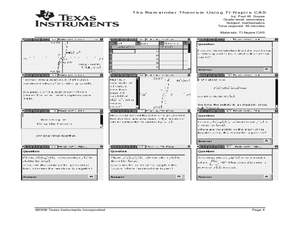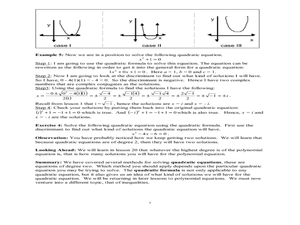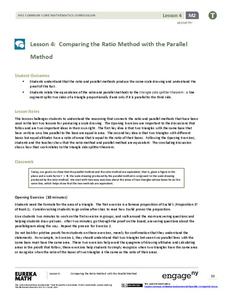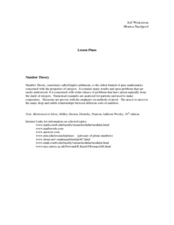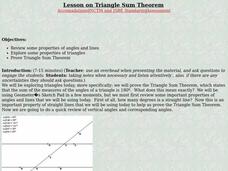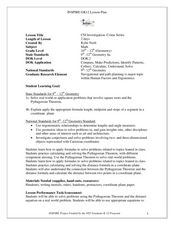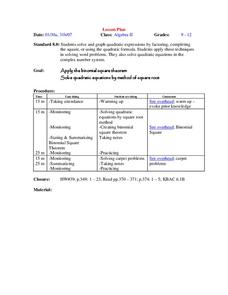Curated OER
The Remainder Theorem Using TI-Nspire CAS
Investigate the Remainder Theorem in this algebra lesson. Explore the relationship between the remainders of polynomial division and the function. Each of the four problems gets progressively more complicated. This might be a great...
Curated OER
Watch Your P's and Q's
Using your graphing calculator, find all the rational zeroes of a polynomials by using the Rational Zero Theorem. Divide polynomials using the Remainder Theorem and the Factor Theorem and then graph it to find the number of real roots.
EngageNY
Scale Factors
Is it bigger, or is it smaller—or maybe it's the same size? Individuals learn to describe enlargements and reductions and quantify the result. Lesson five in the series connects the creation of a dilated image to the result. Pupils...
EngageNY
The Remainder Theorem
Time to put it all together! Building on the concepts learned in the previous lessons in this series, learners apply the Remainder Theorem to finding zeros of a polynomial function. They graph from a function and write a function from...
Curated OER
Quadratic Equations with Negative Discriminate
Solve polynomial equations of degree using different theorems and apply the zero factor theorem for unknown numbers in a quadratic equation. Also use the discriminate to find out the kind of solutions to given quadratic equations shown.
EngageNY
Fundamental Theorem of Similarity (FTS)
How do dilated line segments relate? Lead the class in an activity to determine the relationship between line segments and their dilated images. In the fourth section in a unit of 16, pupils discover the dilated line...
Illustrative Mathematics
The Missing Coefficient
This activity highlights the use of the remainder theorem to solve for the unknown coefficient of a specified polynomial when given one of its factors. Use this single problem as a warm-up exercise, a quick check-in at the end of a...
EngageNY
Comparing the Ratio Method with the Parallel Method
Can you prove it? Lead your class through the development of the Side Splitter Theorem through proofs. Individuals connect the ratio and parallel method of dilation through an exploration of two proofs. After completing the proofs,...
Curated OER
Pythagorean Theorem
Students solve problems using the Pythagorean Theorem. In this geometry instructional activity, students identify the sides and angles of a right triangle. They find the different trigonometric ratios and solve using sine, cosine and...
Curated OER
Introducing the Concept Prime Factors
Fifth graders identify the prime factorization for 48 using different sets of factors. They find the prime factorization for 60.
Curated OER
Number Theory
Learners explore the concept of number theory. They discuss an assortment of number theory topics such as prime numbers, composite numbers, GCF, modular arithmetic, and others in a lecture style discussion. Pupils view videos about these...
Curated OER
Going Back to Your Roots
Investigate the Fundamental Theorem of Algebra and explore polynomial equations to determine the number of factors, the number of roots, and investigate multiplicity of roots.
Curated OER
Operations of Complex Numbers and Intro to DeMoivre's Theorem
Students solve problems with complex numbers. In this algebra instructional activity, students factor complex numbers and simplify equations using DeMoivre's Theorem. They add, subtract, multiply and divide using negative roots.
EngageNY
Obstacles Resolved—A Surprising Result
The greater the degree, the more solutions to find! Individuals find the real solutions from a graph and use the Fundamental Theorem of Algebra to find the remaining factors.
EngageNY
First Consequences of FTS
Challenge the young mathematicians to find the exact coordinates of a dilated point. The fifth segment in a 16-part series introduces the class to the converse of the Fundamental Theorem of Similarity. Scholars use the theorem to...
West Contra Costa Unified School District
Polynomial Division
Multiply the ways your scholars can find the quotient with polynomial division. A lesson plan introduces polynomial division via long division, synthetic division, generic area model, and using the definition of division. Learners...
EngageNY
How Do Dilations Map Segments?
Do you view proofs as an essential geometric skill? The resource builds on an understanding of dilations by proving the Dilation Theorem of Segments. Pupils learn to question and verify rather than make assumptions.
Curated OER
Triangle Sum Theorem
Tenth graders investigate the theorems of angles and lines to prove triagle sum theorem. In this geometry activity, 10th graders discuss the theorems of triangles and how it is used to solve for missing sides or angles. They review how...
West Contra Costa Unified School District
Polynomial Division
How do you apply the traditional division algorithm to polynomials? Here is an Algebra II lesson that extends the use of the division algorithm to polynomials. After establishing the concept of long division, synthetic division and the...
EngageNY
Informal Proof of AA Criterion for Similarity
What does it take to show two triangles are similar? The 11th segment in a series of 16 introduces the AA Criterion for Similarity. A discussion provides an informal proof of the theorem. Exercises and problems require scholars to apply...
Curated OER
Patterns in Pascal's Triangle
Learners examine the patterns in Pascal's Triangle. In this recognizing lesson, students view a model of Pascal's Triangle and describe the patterns of the multiples. Learners identify the shapes that are made within Pascal's Triangle.
Curated OER
Polynomials Functions
High schoolers factor polynomials and linear functions and apply concepts of the fundamental theorem of algebra to solve problems. They graph their solutions and analyze the graph.
Curated OER
CSI Investigation
Pupils solve real life situation using the Pythagorean Theorem. In this geometry instructional activity, students calculate the length, midpoint and slope of segments. They solve word problems using properties of square roots.
Curated OER
Quadratic Equations and Binomial Square Theorem
Students factor quadratic equations. In this algebra lesson, students apply the binomial square theorem to solve quadratics. They complete the square and use the complex number system to solve for the roots.
